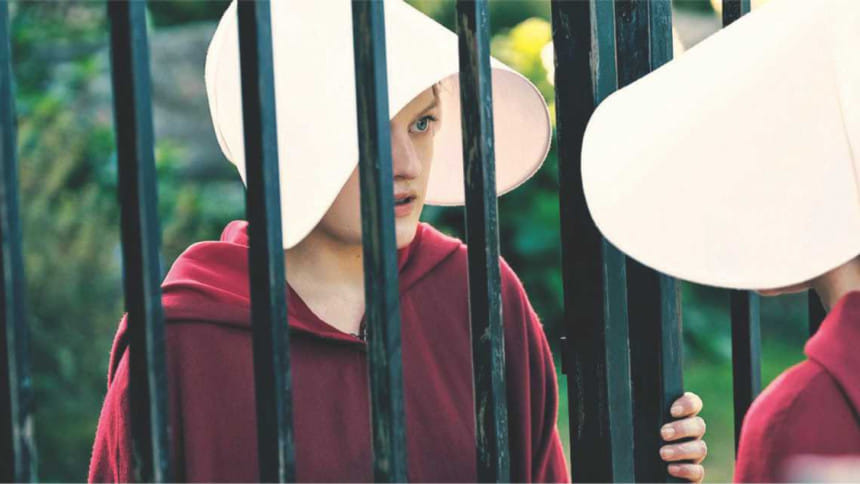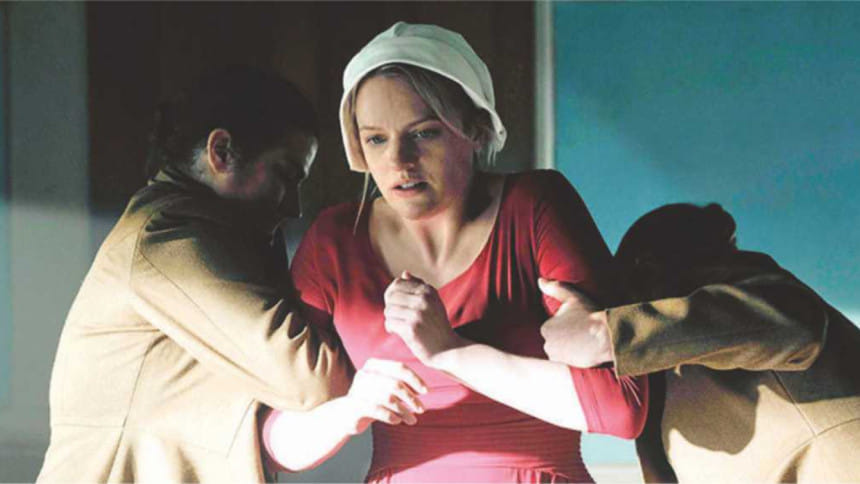'The Handmaid's Tale' is a dystopia all too familiar

The television adaptation of Margaret Atwood's 1985 novel, The Handmaid's Tale, is perhaps more hyperrealist than dystopian. In the apocalyptic near-future, birth rates have declined due to sterility from sexually transmitted diseases and environmental pollution. Amidst this chaos, Gilead, a totalitarian, Christian theonomy, has overthrown the American government under the pretext of restoring order. And under this new world order, women have been stripped of all their rights, and segregated into social classes on the basis of their fertility.
The story is told in the first person by a woman called Offred (a slave name meaning Of Fred), one of a class of women who have been enslaved to bear children for Commanders and their wives, i.e. the ruling class. Unlike the books, where the real name of the protagonist is never directly revealed to the reader, the very first episode of the series discloses her real name—June. This revelation both humanises and empowers the protagonist. Whereas the Offred of the book was resigned, a witness more than anything, the Offred of the television series increasingly becomes a heroine.
While we as viewers often fail to look beyond the machinations of the fantasy genre to appreciate the underlying metaphors and warning signs, The Handmaid's Tale is at once so violent and familiar, that its implications are difficult to dismiss. As Atwood herself has said on the novel, “One of my rules was that I would not put any events into the book that had not already happened in what James Joyce called the 'nightmare' of history, nor any technology not already available. No imaginary gizmos, no imaginary laws, no imaginary atrocities. God is in the details, they say. So is the Devil.” The concept of conscripting fertile handmaids to the highest in society itself is an interpretation of a Biblical account. Rachel and Leah were sisters married to Jacob. Rachel, who cannot give Jacob a child, convinces her husband to impregnate her handmaid Bilhah so she can have children “through” her. This ritualised rape is normalised and sanctified in Gilead by being named 'the Ceremony'.

Biblical references aside, systemised propagation of the gentility has a historical precedent dating back to the Lebensborn programme of the Nazi regime. In 1935, Germany's birth rates were dropping, and Hitler's right hand man had designed a breeding programme to promote an 'Aryan' future. This involved members of the SS mating with suitable German women, and kidnapping blue-eyed, blonde-haired children to populate the Third Reich.
And yet, the system does not work even with controlled reproduction. Many of the Commanders themselves are infertile and the handmaids end up being “assisted” by the good doctor to conceive. Such a system should naturally crumble under its own weight, but instead, other nations want to follow suit and even purchase handmaids for the propagation of their own people. In the most brutal and crushing twist of fate, Mexico's ambassador, who herself is a woman, visits to complete a trade agreement for handmaids.
And while the series is set in the white-majority West, at times, many of the elements feel too close to home for comfort. For instance, in the days leading up to the coup by the fundamentalist right, Offred, still called June at the time, goes for a run with her best friend Moira, wearing the shorts-and-spandex workout gear that is ubiquitous in the West. The man at the coffee shop they stop at for drinks says their money's no good here—June's debit card is literally declined even though she just deposited a check. When she asks him to try again, the man calls them sluts and forces them to leave. Take away the colour of their skin, and the looming threat of religious fundamentalism and slut-shaming is all too recognisable in our very own society.
But if the slut-shaming does not hit a nerve, it is when the women are dispossessed off their financial assets and evicted from their offices that may invoke the strongest reaction in a viewer and a woman. Even in our country, although women are earning more, they often do not have control over their own assets. The omnipresent, collective fears of women are so concentrated in their portrayal, that at first The Handmaid's Tale may seem fantastical. In fact, there is no better and accurate representation of the horror and oppression that can become normal.
Saudi-American poet Majda Gama described to the Times being unable to sleep after watching the opening episodes of the television series. “What Offred, the handmaid, lived as some cautionary tale felt very much like my lived reality. One woman's dystopia is another woman's reality,” she said. The Handmaid's Tale makes us aware of the many freedoms we take for granted, and conversely, the many understated ways in which society attempts to control our minds and bodies. If events are unfolding too slowly around us to start questioning the powers that be and not just accept whatever comes our way, then let television shake us out of our complacence, with a depicted reality that is borderline, not distant, that is imaginable, not extraordinary.

 For all latest news, follow The Daily Star's Google News channel.
For all latest news, follow The Daily Star's Google News channel. 



Comments